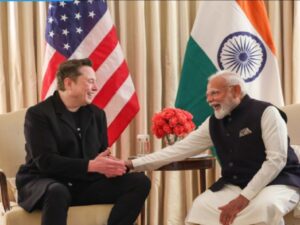PM Modi says committed to big reforms, world looking to invest in India
New Delhi, Aug 15 (PTI) Prime Minister Narendra Modi on Thursday underscored his government’s commitment to reforms as not the one undertaken out of any compulsion but as a result of deep conviction for boosting economic growth and said the world is now looking to invest in India.
Addressing the nation from the ramparts of the Red Fort on the 78th Independence Day, he singled out reforms in the banking sector that made available easy credit to entrepreneurs and businesses, skill development and manufacturing that has turned India from a mobile phone importer to an exporter now.
These together with policies for socio-political development will help India become a developed nation by 2047.
“Developed India by 2047 is not just a slogan. There is sheer hard work that is going behind it,” he said.
Committing to continue the reform process that has opened up sector after sector, lightened regulations, provided easy credit and reduced governance interference, he said this path has been chosen to fulfil aspirations of youth.
“I want to assure that our commitment to reforms is not limited to getting good editorial in pink papers (economic newspapers). This commitment is not to garner praise in the short term,” he said.
In an apparent comparison with a crisis triggering the 1991 economic reforms, he said, “Our reforms are not out of any compulsion. The reforms are to make India and its economy stronger. Reforms are our blueprint for growth.
“We are not doing anything because of political compulsions or due to any political arithmetics. Our commitment is Nation First with national interest being supreme,” he said.
Listing some of the reforms that have transformed the economic scene in the last 10 years, the Prime Minister said the banking sector has been overhauled, making it stronger that has provided strength to the formal economy as well as addressing banking needs of the poor and middle class.
Strengthening of the banking sector has helped widen availability of easy credit – from loans for purchase of automobiles to starting a startup and pursuing education.
This has helped a wide range of people – from animal keepers to roadside vendors, to small and medium businesses and entrepreneurs, he said.
Modi said the reforms also meant the end of ‘mai-baap’ culture where the government behaved like masters and citizens always doubted them in everything.
“Today the government itself goes to the beneficiaries, it reaches cooking gas connections to households, provides water, making available electricity, and extends economic help,” he said.
The government, he said, is committed to “big reforms” that will accelerate growth and progress.
He however did not elaborate.
The Prime Minister called it ‘Golden Era’ for the country that is opening up employment avenues.
Recounting his speeches from the Red Fort that have been turned into reality, Modi said 18,000 villages that didn’t have electricity have been given access to power, more than two-and-half-crore Indians got electricity connections, and 12 crore families have been provided tap water.
The opening up of the space sector has led to startups launching private satellites and rockets, he said.
“Today I can say that when the policy is right, intentions are correct and welfare of the nation is supreme, definite results can be achieved,” he said.
Stating that modern infrastructure aids development, the Prime Minister said massive rail, road, port and broadband connectivity programmes have helped boost growth.
The government is also committed to reforms in governance.
Recounting his government’s achievements, he said per capita income has doubled, India’s share in global growth increased, the number of airports has risen, foreign exchange reserves have doubled, and confidence of global institutions in the country has increased.
India has also transformed from being an importer of mobile phones to one that has a manufacturing ecosystem that also exports to the world, he said adding as 5G telephony rolls out across the country, work on the next generation, 6G has already begun.
The Prime Minister said that semiconductors, modern technologies and Artificial intelligence are inextricably linked to the future and “we have started working on the Indian Semiconductor mission”.
He exhorted that why can’t every piece of equipment have a ‘Made In India” chip? He further said that our country has the potential of fulfilling this dream and therefore the production and semiconductor-related work will happen here in India. India has the talent and the means to provide the world with end-to-end solutions.
“Today many big companies of the world want to invest in India,” he said. “Most people who are seeking a meeting with me in my third term are investors.
Investors from “all over the world want to come and invest in India,” he said.
This, he said, was a huge golden opportunity and states should look to attract investors by ensuring good governance and law and order.
States should bring changes in the policies as needed, he said. “If land is required, states should create a land bank.”
On opportunities before the country, he said gaming is a big market worldwide and the country with best known IT professionals can take a lead in gaming as well as AI.
He reiterated the government’s commitment to attaining 500 GW of non-fossil fuel energy capacity by 2030 as well as making India a hub for green hydrogen manufacturing.
This would not just help meet climate goals but also create green jobs, he said.
The Prime Minister said suggestions have been pouring in from different quarters on how to achieve the goal of making India a developed nation by 2047. The suggestions range from developing the country as the skill capital of the world to making it a manufacturing hub and becoming self-reliant in all aspects of the economy, while some have suggested making Indian universities truly global, he said.






